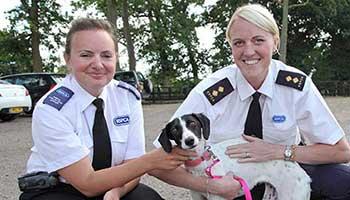RSPCA calls on Government to finally commit to phasing out animal experiments
13.07.23
As a Home Office report published today reveals the lowest number of scientific procedures on animals since 2002, the RSPCA is highlighting that millions of animals are still used in procedures that cause pain, suffering, distress and lasting harm.
The animal welfare charity says that despite the fall, the figures highlight the sheer number of sentient animals still used in scientific procedures. RSPCA experts say the fact millions of scientific procedures involving animals still take place only underlines the need for a clear commitment, and strategy, from the UK Government to phase out animal experiments and invest in humane alternatives.
The statistics released today show that in the UK during 2022:
- 2.76 million scientific procedures involving living animals were carried out in Great Britain; a decrease of 10% on 2021 and the lowest number since 2002.
- The proportion of experimental procedures that caused severe suffering has increased slightly, from 3.4 to 3.6 % (though numbers have decreased), and the number of ‘moderate’ procedures has increased from 22 to 27 %.
- Experimental procedures decreased by 12% and procedures for the creation and breeding of genetically altered (GA) animals decreased by 6% since 2021.
- Experimental procedures made up 55% of all procedures, with experiments for the protection of the natural environment seeing the largest increase (35%) in this area (5,916 in 2022 from 4,372 in 2021).
- The majority (96%) of procedures (both for experimental and breeding purposes) used mice, fish, birds or rats; these species have been the most used for more than a decade.
- Procedures on specially protected species (cats, dogs, horses and non-human primates) accounted for use in 0.97% of experimental procedures; no specially protected species were used in procedures counted under creation and breeding of GA animals.
Dr Penny Hawkins, head of the animals in science team at the RSPCA, said:
“Whilst it is positive to see the overall number of animals being used in scientific experiments decreasing, now is not the time to become complacent or accept the status quo. Millions of animals are still used in scientific research and testing, and we need a clear commitment and strategy from the UK Government to transition to non-animal technologies.
“The Home Office report showed despite this overall decrease, the proportion of experimental procedures that caused severe suffering has increased, and the percentage of ‘moderate’ procedures has also increased - which is deeply concerning to us. Animals can and do experience pain and distress as a result of being used in experiments and any increase, however small, in animal suffering is a huge worry for the RSPCA.
“Over the last year, we have seen the UK Government take a sharp fall away from its prized position as a world leader in animal welfare, as they continually u-turned on key policies - breaking promises they assured the public they would keep. Committing to a clear pathway to phasing out animal experiments, and increasing investment in Non-Animal Technologies, would be a highly positive way to start to win back public trust.
“Ending severe suffering is a top priority for the RSPCA, and we have worked with the scientific community to help achieve a 61 percent reduction in experimental procedures causing severe suffering between 2014 and 2021. We will continue to focus on this essential goal, including within the areas of regulatory testing highlighted by the Home Office Statistics.”
Avoiding and reducing animal use
The RSPCA is calling for a clear statement, and commitment, from the UK Government, that phasing out animal experiments is a legitimate and desirable goal, as well as asking for more investment in developing, validating and using Non-Animal Technologies.
“As one of the world’s largest lab animal users, the UK has a responsibility to lead the agenda on phasing out animal use - but we are currently in danger of being left behind by the scientific ambition and leadership of other countries.”
Dr Hawkins continued:
“This current lack of commitment is simply not good enough. Public concerns are consistently high, with three quarters of people in the UK² agreeing there should be more research into humane alternatives.
“A strategy for phasing out animal use is not about stopping important research, it is about reducing and avoiding the negative impacts - lab animal use and suffering. Phasing-out the use of animals is good for UK science, the economy and animal welfare.
“The Home Office stated in its report that factors affecting animal use include ‘global trends in new technologies’. If the decrease in numbers is due to researchers wanting to use non-animal technologies, and better availability of these, this is great news for lab animals and the public. There is clearly a pathway forward that is well supported, even in its infancy, by many within the scientific community and the general public, now we just need the UK Government to throw its support behind phasing out lab animal use. The world is increasingly ready for progress, now it is just a question of funding and legislation.”
Presently, the UK spends only a tiny fraction of its annual budget on Non-Animal Technologies, but the RSPCA has called for urgent change.
Dr Hawkins added:
“If the UK Government is serious about becoming a global science superpower and also wants the UK to benefit economically from being a significant player in the market for Non-Animal Technologies, it must recognise the sound scientific and ethical reasons for transitioning away from using animals in experiments that can cause them pain, suffering and distress.
“There is also increasing recognition of the scientific limitations of many animal models and tests. The global non-animal alternatives testing market is growing annually and is expected to be worth an estimated £2.1billion by 2026, but despite this, the UK Government has steadfastly refused to commit to working to phasing out animal use in science, and currently spends only around 0.13% of its £8bn annual budget for research and innovation directly towards developing Non-Animal Technologies.”
Find out more about the Society’s campaign to achieve a phase out of animal experiments.


